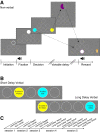Time preferences are reliable across time-horizons and verbal versus experiential tasks
- PMID: 30719974
- PMCID: PMC6363390
- DOI: 10.7554/eLife.39656
Time preferences are reliable across time-horizons and verbal versus experiential tasks
Abstract
Individual differences in delay-discounting correlate with important real world outcomes, for example education, income, drug use, and criminality. As such, delay-discounting has been extensively studied by economists, psychologists and neuroscientists to reveal its behavioral and biological mechanisms in both human and non-human animal models. However, two major methodological differences hinder comparing results across species. Human studies present long time-horizon options verbally, whereas animal studies employ experiential cues and short delays. To bridge these divides, we developed a novel language-free experiential task inspired by animal decision-making studies. We found that the ranks of subjects' time-preferences were reliable across both verbal/experiential and second/day differences. Yet, discount factors scaled dramatically across the tasks, indicating a strong effect of temporal context. Taken together, this indicates that individuals have a stable, but context-dependent, time-preference that can be reliably assessed using different methods, providing a foundation to bridge studies of time-preferences across species.
Editorial note: This article has been through an editorial process in which the authors decide how to respond to the issues raised during peer review. The Reviewing Editor's assessment is that all the issues have been addressed (see decision letter).
Keywords: computational biology; decision-making; delay-discounting; experiential; human; intertemporal; neuroscience; perceptual; systems biology.
© 2019, Lukinova et al.
Conflict of interest statement
EL, YW, SL, JE No competing interests declared
Figures


















References
-
- Andersen S, Harrison GW, Lau MI, Rutström EE. Discounting behavior: a reconsideration. European Economic Review. 2014;71:15–33. doi: 10.1016/j.euroecorev.2014.06.009. - DOI
-
- Andreoni J, Kuhn MA, Sprenger C. Measuring time preferences: a comparison of experimental methods. Journal of Economic Behavior & Organization. 2015;116:451–464. doi: 10.1016/j.jebo.2015.05.018. - DOI
-
- Augenblick N, Niederle M, Sprenger C. Working over time: dynamic inconsistency in real effort tasks. The Quarterly Journal of Economics. 2015;130:1067–1115. doi: 10.1093/qje/qjv020. - DOI
Publication types
MeSH terms
Grants and funding
LinkOut - more resources
Full Text Sources
Research Materials

